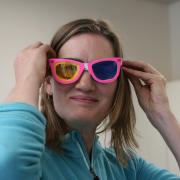Children’s galleries: creating 'better human beings?'
The challenges we’re facing in the Anthropocene can be overwhelming but look at it this way: we are alive, flooding is not a constant issue (yet) and the next generation are ingenious, creative, loaded-with-21st-century-skills kids - they can fix anything! We design children’s galleries with the intention of making children ‘better human beings’, empowering them with the notion that if they dare to be creative, they can save the world! But is this approach empowering? To what extent should children’s galleries try to empower children to ‘save the future?’ Should children’s exhibitions simply be a place of fun and discovery?
After hearing different perspectives on this issue, participants take on the roles of children, parents, scientists and science communicators with a purpose of reaching true empowerment and shared responsibility for the environment.
Session speakers
Professor of science and environmental education
Justin focuses on the role of research in helping science engagement institutions to address 'wicked problems' through their work. He will elicit how children's exhibitions could go beyond 'encouraging future generations of scientists' to real behavioral change. What should change in museums in order to become social actors? How to give children confidence in acting on these issues, without overwhelming them? In short: how can children's exhibitions contribute to the making of a better world?
consultant and President Emerita, Phillip and Patricia Frost Museum of Science
Gillian Thomas will focus on the involvement of parents in creating environmental awareness for young visitors. She will share her findings on how to attract parents and children to learning about the environment, and how engaging with attractive topics could lay the basis for environmental stewardship at an early age. How can children's exhibitions encourage both parents and children to build their science capital and learn to care and jointly share responsibility for the environment?
Vicky Cave focuses on how play in children's exhibitions can actually lead to small children becoming more knowledgeable about the environment. Through experiences in children's exhibitions at an early age, positive attitudes towards the potential of STEM to make a difference for our world can be nurtured. How to keep these experiences in children's exhibitions deeply enjoyable and simultaneously let them become engaged in the complex problems of the 21st century?
Juanita will share some insights from conversations with adolescents around food, plants and climate change. School pupils in Switzerland are engaging with these issues by creating their own Climate Garden and designing plant biology experiments to run in it. We engage our very young audience with playful storytelling and art activities. What can we learn from conversations with these young target groups for effectively stimulating environmental stewardship?





